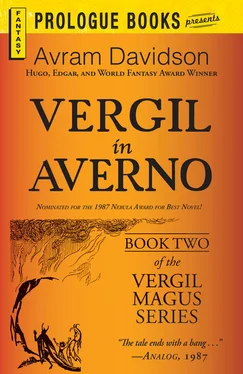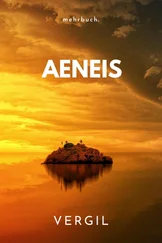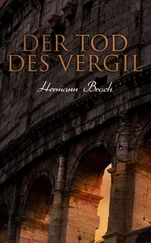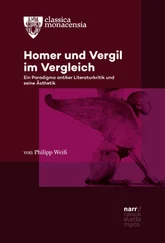Avram Davidson - Vergil in Averno
Здесь есть возможность читать онлайн «Avram Davidson - Vergil in Averno» весь текст электронной книги совершенно бесплатно (целиком полную версию без сокращений). В некоторых случаях можно слушать аудио, скачать через торрент в формате fb2 и присутствует краткое содержание. Жанр: Фэнтези, на английском языке. Описание произведения, (предисловие) а так же отзывы посетителей доступны на портале библиотеки ЛибКат.
- Название:Vergil in Averno
- Автор:
- Жанр:
- Год:неизвестен
- ISBN:нет данных
- Рейтинг книги:3 / 5. Голосов: 1
-
Избранное:Добавить в избранное
- Отзывы:
-
Ваша оценка:
- 60
- 1
- 2
- 3
- 4
- 5
Vergil in Averno: краткое содержание, описание и аннотация
Предлагаем к чтению аннотацию, описание, краткое содержание или предисловие (зависит от того, что написал сам автор книги «Vergil in Averno»). Если вы не нашли необходимую информацию о книге — напишите в комментариях, мы постараемся отыскать её.
Vergil in Averno — читать онлайн бесплатно полную книгу (весь текст) целиком
Ниже представлен текст книги, разбитый по страницам. Система сохранения места последней прочитанной страницы, позволяет с удобством читать онлайн бесплатно книгу «Vergil in Averno», без необходимости каждый раз заново искать на чём Вы остановились. Поставьте закладку, и сможете в любой момент перейти на страницу, на которой закончили чтение.
Интервал:
Закладка:
Vergil began to laugh, his head thrown back so far that his tar-black beard jutted straight out. “Bawd, pimp, and punk!” the man screamed, cursing the still-invisible though hardly inaudible jackass, kicking dust and dung toward its stall. “May devils ride your rod and may it dwindle! May your stones — ”
In a voice still weak from laughter, Vergil urged him to desist. “ — for suppose your curse came true?” he asked. “What of the jack’s stud-fees, man?”
A look of absolute horror expelled all other emotions from the face of Fulgence. “Twenty ducats cost me the beast, and me, I curse his rod!” He smote his forehead with the flat of his hand. “On me let it befall, on me, on me, and not on thee….” It was his voice that dwindled as he considered what he had just said, and his face seemed to writhe in a whirlpool of contradictory feeling, as the last bray ebbed off into silence. Very, very weakly, he said, “For Averno to go, a deposit the most immense it would be essential. A deposit — ”
The stallion gave a scream of pain, the liveryman at once forgot deposits, jackasses, mules, customer, and all; and in an instant was there with the stallion and its agony. “What!” he exclaimed. “Still he didn’t pass? Two days, what, and still no — The louse?” he cried, looking wildly and fiercely at the group of men and boys, some stroking and speaking to it, one holding it at the head, others standing carefully away from the great hooves. The beast was a bay, huge, and a beauty, and it quivered in pain.
Vergil asked, “He has a stricture?” Mostly they gaped at him, but one, the senior hostler by his looks and manner, nodded.
“Yes, master, he — ”
“The louse? The louse?” shouted Fulgence the liveryman.
“ — he hasn’t passed no water for anyway two days. Maybe two ‘n’ a half. The boss he sends out for to get a louse, you know, master — ”
“Ah. Yes, I know.” He knew, Vergil knew, the homely if uncomely remedy: If a louse was placed in the fundament of a horse afflicted with stricture, the crawling of the tiny parasite should produce a shudder that would relax the tautened or tightened orifice.
“ — but we couldn’t get no louse, boss,” a young stable boy grumbled. “Some days beggars be so thick, and everywhere you looks, a scratchin’ of theyselves, till you wants to leap away. Therefore. Dunno where they’m gotten to, today, we see only one, is all, old No Nose, but he — ”
But Fulgence would be butted no buts. “A handful of coppers, I give! Even, I told you, what do they want of me, the filthy, gold? Silver, a silver piece, even. Two hundred ducats cost Hermus, a price for a king! Oh, the gods! Jove, Apollo, Poseidon!” This mixture of the Roman and the Grecian was too common locally even to be noticed by those locally denizened. The great stallion Hermus. . and in truth he did seem a fine beast and perhaps fit for a king and perhaps too fine a beast for a livery stable; some story that one would never, likely, hear, lay behind his presence there. . the bay, Hermus, gave a moan. His master put his hands to his own head. The horse’s health was surely more worth than one piece of gold, but he could not bring himself to pay it; nor was it pure parsimony, either. “They would sneer me forever, upon may I spit; ‘Ha, ho, who, Fulgence! Who for a louse a gold piece did give!’ Hermus. Piss for me!” And no doubt they would, too.
Vergil meanwhile had himself replaced the man by the horse’s head, stroked its neck, stroked its belly, once, twice, thrice, murmured, “Hermus, Hermus, turbid with gold …” And stepped one pace back.
Had a demigod been then and there begotten, as upon Danae the daughter of the Argive king through Jove’s assuming the rather unexpected form of a golden rain to circumvent the locks upon the bronzen tower, there would have been no greater commotion.
Most of the credit at first, however, went to the horse.
But only at first.
And after a while the liveryman Fulgence bethought him of his other business; grateful he must have been, his words of thanks could not have been entirely insincere, but like many another person in many another (and some might think, more exalted) station in life, he was somewhat chary, somewhat leery, of showing overmuch gratitude: and he looked at his customer with a somewhat slanting glance, no longer straight into the face. Gratitude, appreciation, these were all very fine things: but business was, after all, business. Fear of his appreciation and gratitude costing him something was evident; so was his fear of losing the customer’s custom. A nice balance. . and a mixed one. . rather, coming down to specific examples, rather like a mule. “A mule, a mule,” he murmured, waving his hands as though to wave away any reminder that he had ever denied he had a mule, let alone mules, in his place. “The best of mules the master shall to have, a gentle mouth how it has, a back so kindly, the how clever on by craggy roads its feet! As for the deposit …” Here he stopped suddenly. “Averno,” he whimpered, whispered. “Who goes to Averno, does they always come back? De-posit …”
The senior hostler said, low, respectful, but how charged with significance his words, “Hermus be’s the deposit, what me think.”
Fulgence hissed. Fulgence writhed. Slantingly he looked at Vergil. Appeal, greed, fear were in his look. Vergil, saying nothing, showing nothing in his face, merely looked straight on ahead. As it, however, happened, it was the great stallion Hermus who stood right straight ahead where Vergil was looking.
And so Vergil therefore looked straight at Hermus.
Fulgence gave one single short hoot of fear. Then he wilted. “It must be no mule,” he said, after several long and audible swallows. He gestured to his senior hostler, the gesture — toward some more distant stall — meant nothing to Vergil, but it evidently meant something to the senior hostler. And, it was clear, to the junior ones as well. Relief showed, and even respect. The older man bowed to Vergil, bowed to his own master, went off, nodding his head as he went. Another gesture, and Hermus was led away and into his own stable. Back came the senior, leading another horse, a roan, led it to the place where Vergil’s eyes still looked.
“This one be a good one, sir,” he said.
His voice placed a slight emphasis on good . The liveryman perhaps did not like the implication, his lips moved, then he shrugged, then he looked at his purse hanging at his belt over his slight paunch. He swallowed again. “I leave to the master his choice. Should he choose this Prima, he choose a good mare, no filly, no maiden-mare all so skittish, but he choose a matron-mare: steady, secure, strong, she. If she would have a sometime a little humor, just a little and no more would it be, to go a little right, or a little left to go, or to over her shoulder to look, well.” He shrugged again. “The master is no cruel and he would allow and it would all right be.”
“This one be a good one, sir.”
Vergil now allowed, first his eyes, then his hands, to move over the mare. All seemed true. She gave her head a slight toss. She seemed already to have accepted him. He seemed already to have accepted her. Already, in this short moment, they seemed familiar with each other. Vergil gave a long, slow nod. And once again he saw and heard the liveryman swallow. The only slightly protuberant eyes besought him somewhat more. Vergil waited.
“I leave to the master his generous, he would compassion have. Like a nobleman, he would wish the payings for two weeks in advance to pay.” Vergil thought this, from his own acquaintance with nobility, perhaps the very last thing a nobleman would wish; but he let the thought pass by, and, the purse being now open in Fulgence’s slightly trembling hands, he put money in it.
Читать дальшеИнтервал:
Закладка:
Похожие книги на «Vergil in Averno»
Представляем Вашему вниманию похожие книги на «Vergil in Averno» списком для выбора. Мы отобрали схожую по названию и смыслу литературу в надежде предоставить читателям больше вариантов отыскать новые, интересные, ещё непрочитанные произведения.
Обсуждение, отзывы о книге «Vergil in Averno» и просто собственные мнения читателей. Оставьте ваши комментарии, напишите, что Вы думаете о произведении, его смысле или главных героях. Укажите что конкретно понравилось, а что нет, и почему Вы так считаете.












